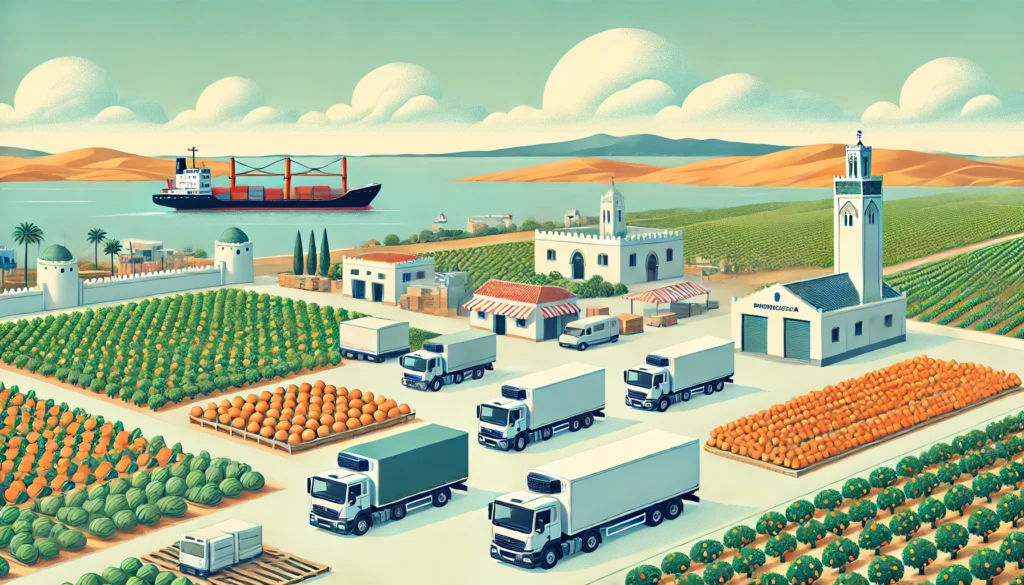In recent years, Morocco has emerged as a critical hub for food logistics in North Africa, thanks to its strategic geographic location, robust agricultural sector, and well-established transportation networks. The country is not only a key player in supplying its own population with food but also serves as a bridge for exports to Europe, Africa, and the Middle East. However, the logistics of moving food products in Morocco come with unique challenges and opportunities that are shaping the future of this vital industry.
The Agricultural Backbone of Morocco
Morocco’s food logistics are heavily influenced by its rich agricultural resources. The country’s diverse climate and terrain allow for the production of a wide variety of crops, from citrus fruits and vegetables to olives, grains, and livestock. Agriculture plays a crucial role in Morocco’s economy, employing around 40% of the population and contributing nearly 14% to the country’s GDP.
Regions like the Souss-Massa and Gharb are particularly known for high agricultural output, while the fertile plains of the Atlas Mountains are critical for growing fruits and vegetables. This abundant production requires an efficient logistics system to transport goods from rural areas to urban markets and international destinations.
Key Components of Morocco’s Food Logistics
1. Transportation Infrastructure
Morocco boasts a growing network of highways, railways, ports, and airports, all of which are essential for the food logistics sector. The Tangier Med Port, one of the largest in the Mediterranean, plays a significant role in handling food exports, particularly to Europe. Meanwhile, domestic food transportation is largely dependent on trucks, which face challenges such as traffic congestion and the rugged terrain in rural areas.
The Moroccan government has made significant investments in improving the country’s transportation infrastructure, which includes the expansion of the rail network and highways that connect agricultural hubs with major cities and ports. However, ongoing efforts are needed to streamline these routes and ensure timely deliveries, especially for perishable goods.
2. Cold Chain Management
One of the most critical aspects of food logistics is maintaining a robust cold chain to preserve the quality and safety of perishable products like fruits, vegetables, and dairy. Morocco’s growing export market for perishable goods has placed a spotlight on the need for efficient cold storage and refrigerated transportation.
Despite improvements, cold chain infrastructure in Morocco remains underdeveloped in certain regions, particularly rural areas where many agricultural products are grown. This can lead to delays and food spoilage, which not only affects domestic consumption but also impacts Morocco’s competitiveness in the global market.
3. Customs and Regulations
For exporters, navigating the customs and regulatory requirements in Morocco is a significant factor in ensuring the smooth flow of goods across borders. The country has made strides in simplifying procedures at its major ports and airports, yet challenges remain in meeting international standards, especially for food safety.
Initiatives such as the Green Morocco Plan have aimed to modernize the agricultural sector, including adherence to international safety and quality standards. Exporters must stay informed about these regulations and ensure that their logistics partners are equipped to handle the necessary documentation and inspections.
4. Sustainability in Food Logistics
In recent years, sustainability has become a critical focus for Morocco’s food logistics industry. As climate change continues to impact agricultural production, there is increasing pressure to adopt environmentally friendly practices in the transportation and storage of food products. This includes reducing the carbon footprint of trucking fleets, minimizing food waste through better supply chain management, and investing in renewable energy for cold storage facilities.
Morocco has also made commitments to sustainable development, which are reflected in the national strategies to promote eco-friendly practices in the logistics sector. This is especially important for maintaining the long-term viability of the country’s agricultural exports, particularly as international markets increasingly prioritize sustainability.
The Future of Food Logistics in Morocco
As Morocco continues to expand its role as a key player in global food trade, the need for efficient and sustainable logistics solutions will become even more critical. The Moroccan government, along with private sector partners, must continue to invest in infrastructure, cold chain technology, and regulatory frameworks to meet the growing demands of both domestic and international markets.
Additionally, leveraging technology, such as the use of real-time tracking and inventory management systems, can help improve the efficiency and transparency of Morocco’s food supply chains. Collaboration between stakeholders in agriculture, transportation, and government will be essential for addressing the challenges and capitalizing on the opportunities that lie ahead.

